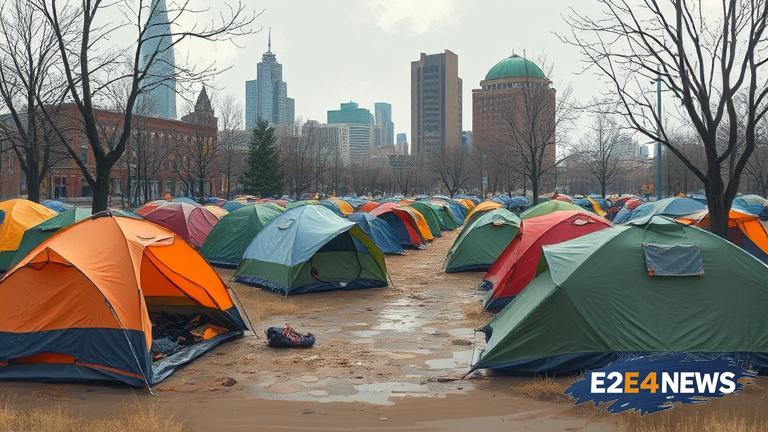The Minneapolis encampment clearing, which commenced on Tuesday, has sparked widespread controversy and concerns for the well-being of the city’s homeless population. The encampment, located near the intersection of Hiawatha and East 28th Street, had grown to become one of the largest in the city, with over 300 residents. Despite efforts by local organizations and advocates to provide support and services, the city deemed the encampment a health and safety hazard, citing concerns over sanitation, crime, and the presence of hazardous materials. As a result, the city began clearing the site, with crews arriving early Tuesday morning to dismantle tents and remove debris. Many residents were given little notice, and some were forced to abandon their belongings, including vital medications and personal documents. The clearing has left many without access to basic necessities, including food, water, and shelter. Local organizations, including the Salvation Army and Catholic Charities, have stepped in to provide temporary support, but many are concerned about the long-term implications of the clearing. The city has promised to provide alternative housing options, but many are skeptical, citing a lack of available affordable housing in the area. The controversy surrounding the encampment clearing has sparked a wider debate about the city’s approach to addressing homelessness, with some arguing that the focus should be on providing supportive services and affordable housing, rather than simply clearing encampments. Others have raised concerns about the potential for displacement and the impact on vulnerable populations, including families with children and individuals with disabilities. The city’s decision to clear the encampment has also been criticized by local advocates, who argue that it will only serve to further marginalize and stigmatize the homeless population. As the situation continues to unfold, many are calling for a more comprehensive and compassionate approach to addressing homelessness in Minneapolis. The city’s response to the crisis has been widely criticized, with some arguing that it is a symptom of a larger systemic failure to address the root causes of homelessness. Despite the challenges, local organizations and advocates remain committed to providing support and services to those in need, and are working tirelessly to ensure that the rights and dignity of the homeless population are respected. The encampment clearing has also raised questions about the role of law enforcement in addressing homelessness, with some arguing that a more nuanced approach is needed, one that prioritizes outreach and support over enforcement. As the city moves forward, it is clear that a more comprehensive and multifaceted approach will be needed to address the complex issues surrounding homelessness. This will require a coordinated effort from local government, organizations, and community members, as well as a commitment to providing supportive services, affordable housing, and a safe and dignified environment for all. The situation in Minneapolis serves as a stark reminder of the need for a more compassionate and effective approach to addressing homelessness, one that prioritizes the needs and dignity of the most vulnerable members of our society. In the coming days and weeks, it will be important to monitor the situation closely, and to hold city officials accountable for their response to the crisis. Ultimately, the goal should be to ensure that everyone has access to safe, affordable, and dignified housing, and that the rights and dignity of the homeless population are respected and protected. The city’s approach to addressing homelessness will be closely watched, and it is hoped that a more comprehensive and compassionate approach will emerge, one that prioritizes the needs and dignity of all members of the community. The clearing of the Minneapolis encampment serves as a reminder of the urgent need for action, and the importance of working together to address the complex issues surrounding homelessness. By prioritizing supportive services, affordable housing, and a safe and dignified environment, it is possible to create a more just and equitable society, one in which everyone has the opportunity to thrive.
